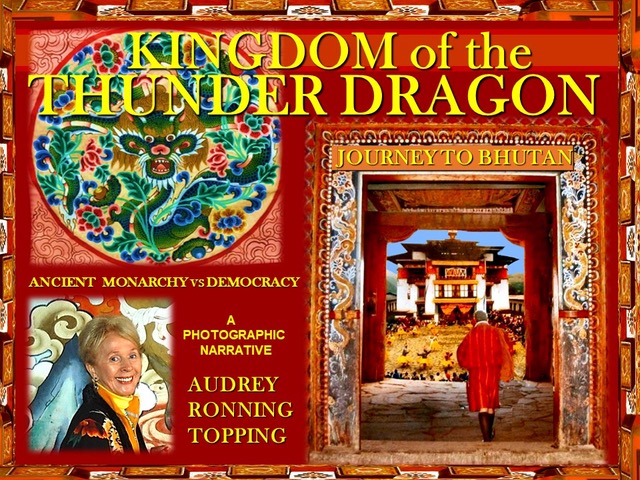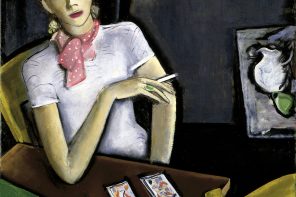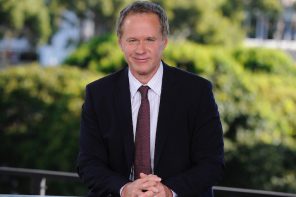Gross National Happiness is an aspiration, a set of guiding principles through which we are navigating our path towards a sustainable and equitable society. It is our North Star.
— Thakur Singh Powdyel, former prime minister of Bhutan
In his 1933 novel “Lost Horizon,” James Hilton sets his Shangri-La — the remote Himalayan utopia that his main character discovers, loses and seeks to regain — in Tibet. But he might as well have been talking about Bhutan, where the pursuit of happiness is more important than the pursuit of profit. For April 2014 WAG, Audrey Ronning Topping, our resident Sinologist, wrote about this unusual “Kingdom of the Thunder Dragon,” now a parliamentary democracy. During the pandemic, she has returned to the Bhutan of her 2002 visit and memory to create a photographic book. We recently asked Audrey about the appeal of the topic at this crucial moment in world affairs:
1. Audrey, why did you want to write a book about Bhutan now?
“The main reason I created this photographic narrative about Bhutan now is because since my journey to Bhutan in 2002, the ‘Kingdom of the Thunder Dragon’ has experienced an historic transformation from absolute monarchy to parliamentary democracy without a revolution or a shot fired. The citizens of Bhutan have exhibited touching, patriotic enthusiasm for the new democracy they proudly voted for.
“I am deeply concerned that the U.S.A., governed some 200 years by modern democracy, is in trouble and perhaps Americans might be inspired by this ancient monarchy and the Dragon King who in 1972 coined the motto ‘Gross National Happiness is more important than the Gross Domestic Product.’ The catchphrase went viral: In 2011, the United Nations adopted a General Assembly resolution introduced by Bhutan calling for world leaders to have a “holistic approach to development.” In 2012, the U.N. had another high-level meeting on ‘Happiness and Well-being: Defining a New Economic Paradigm,’ designed to bring sustainable happiness and well-being to the planet.
“The Kingdom of the Thunder Dragon was an absolute monarchy ruled by Dragon Kings since 1907. Then in 1998, the fourth Druk Gyalpo, Dragon King, Jigme Singye Wanchuk, shocked the world by declaring that Bhutan — the sole remaining Buddhist kingdom in the Himalayans without its own army, wedged between two fortified giants, India and China — would become a democratic constitutional monarchy. His Majesty ordered his legal experts to draft a new constitution based on the world’s greatest democracies and began to educate his citizens on the virtues of democracy. The king himself presided at educational meetings at local town halls and held mock elections.
“Then on Jan. 2, 2002, the ancient Land of the Thunder Dragon became the world’s newest democracy. The citizens of Bhutan, inspired by the enlightened monarch, went to the polls to elect members of the upper house of Parliament. They later elected members to the lower house and voted on the draft constitution that had been mailed to every household in the nation.
“In December 2006, after 34 years of sovereign rule, the fourth Dragon King abdicated and designated his responsibilities to his Oxford-educated son, 39-year-old Jigme Khesor Namgel Wangchuck. The constitution was ratified on July 18, 2008. It opened with the identical words originally penned in 1787 by the American forefathers in Philadelphia: ‘We the people.’ The preamble spoke of safeguarding the ‘blessings of liberty.’ Those principles, which still stand at the heart of American democracy, were understood anew by the citizens. The fifth Dragon King was crowned in November 2008. The people welcomed him with painted street signs and festive banners. Traffic circles were decorated with fresh flowers.
On the eighth anniversary of Bhutan’s Independence Day, The Wall Street Journal wrote: “His Majesty deserves to go down in history as his country’s George Washington, John Adams and Thomas Jefferson.”
2. What lessons can we Americans learn from Bhutan?
“I believe the answer to this is still the same as what His Holiness the Gengteng Rinpoche said when I asked him in 2002 What, if anything, Americans could learn from the Bhutanese lifestyle?
“He looked amused and said gently: ‘Although Bhutan is a country without military might, it has managed to keep peace with our powerful neighbors, China and India. Militarily or economically, Bhutan has nothing to offer the United States.But in terms of realizing mental happiness and contentment Bhutan has much to offer. Our traditions are about peace, contentment and harmony with each other and our protected environment. With the intense pace of modern existence, our way of life is a powerful example that Americans could learn from.”
3. As a photojournalist, your books and articles teem with color, pattern, life. Which comes first — photographs or words?
“It really depends on what I am creating. As a photojournalist, I find photos and captions equally important. But when I am doing a photographic narrative, like this book, the photos are most vital to express feelings when words fail.”
4. You come from a long line of China watchers. Your grandparents were missionaries there. Your father, Chester Ronning, a Canadian diplomat there. You and your husband (former New York Times managing editor Seymour Topping) have covered some of the most significant moments in Chinese history. Has the pandemic caused you to reassess that country?
“Yes. I think the pandemic has caused us all to reassess all the important things in life — especially life itself, our various social systems, attitudes toward each other and especially our leaders.
5. Speaking of leadership, how would you assess both Chinese President Xi Jinping and American President Donald J. Trump, who have found themselves at the center of the coronavirus crisis?
“Both China and the U.S.A. are in dire need of enlightened leadership. Power at the end of a gun, extreme wealth, territorial greed and selfish, superior attitudes can only lead to catastrophe. Respect for each other, all sentient beings, Mother Nature and everyone’s God is the name of the game. Obviously, many world leaders could learn from the Dragon King.”





